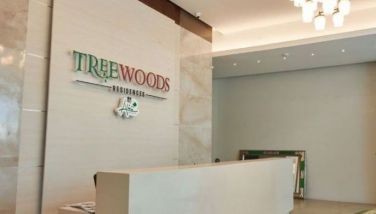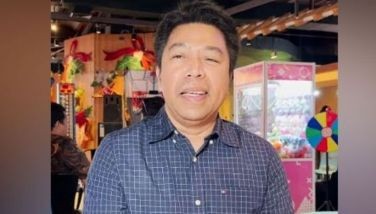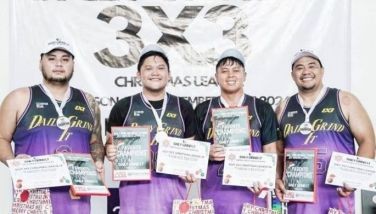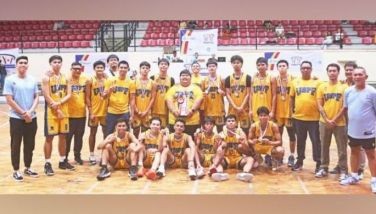Panibagong paraana 2006: Search for projects to reduce inequity
November 11, 2005 | 12:00am
Having "inequality" as one of the biggest obstacles to more rapid development in the Philippines, international and local development partners in the country are once again joining hands to support "Panibagong Paraan 2006".
PP 2006 (Development Innovation Marketplace in the Philippines) is a multi-partner program that encourages and supports innovative ideas to promote "Development with Equity" in the Philippines.
PP 2006 features two competitions. One is the Project Grant Competition, under which winning proponents will receive up to P1 million to implement their projects within a one-year period. Second is the Expression of Ideas Competition.
Panibagong Paraan is the Philippine version of the Global Development Marketplace (DM) initiated by the World Bank Headquarters Office and held in partnership with various partners in Washington DC. The DM is a worldwide competition for innovative projects that address a certain theme.
World Bank Philippines Country Director Joachim von Amsberg earlier said, "the theme is very relevant to the Philippines because inequity limits growth and limits the benefits the poor get from growth. Yet, this topic is seldom a part of the national debate in the Philippines. Development with Equity means reducing inequality and exclusion, tapping the potential that lies in all Filipinos, expanding opportunities of Filipinos who have the least voice and access to resources, and enabling all members of society to have equal chances to share in the fruits of development."
PP 2006 secretariat Rosalinda M. Roy said "Development with Equity" means working for "equal opportunities" and "avoidance of absolute deprivation" in a situation where circumstance often benefit those who already "have" vs. those who "have not".
She added that PP 2006 aims to challenge people to look at various dimensions of "Development with Equity", such as increasing income/income opportunities, improving access to social services, infrastructure and utilities, improving access to/control of land and other assets, improving access to/ensuring fairness in market and financial structures and systems, strengthening participation in decision-making (voice and influence), and improving access to/ensuring fairness in political and justice systems.
Proposed projects have to address any of these primary issues, which will be used as project categories for purposes of evaluation. Proponents need to identify which of the above categories apply to their Concept papers/Proposals.
Project concepts have to address any of the major equity issues cited, and have to benefit marginalized groups such as : women, men or youth in disadvantaged situations, the elderly, children, people with disabilities, small farmers and fishers, laborers, migrant workers, or even entire communities in remote areas or those which are usual victims of disaster.
Proposals for project grants will be valuated on the basis of innovation, scalability and replicability, and potential impact.
PP 2006 aims to raise people's awareness about equity issues, and how these in turn affect growth and development.
"PP wants to create opportunities for groups which do not have the usual access to financial resources for development projects, as the private sector and government do," Roy said.
For the same reason, eligibility among LGUs is limited to those in the 5th and 6th class, since these are the LGUs that have limited resources, and possibly limited capacity to access additional resources.
Eligible proponents include People's organizations, including community-based groups, sectoral associations and cooperatives, non-government organizations, foundations, civic organizations, faith-based and inter-faith organizations, and other civil society organizations (CSOs); private and public research and academic institutions, in partnership with people's organizations or CSOs; and 5th and 6th class local government units (LGUs), including barangays therein, in partnership with local people's organizations or CSOs.
"We can only accept entries from organizations that are already working in the country (which may be local or international organizations). This is to ensure "rootedness" of the project idea - meaning that the idea should come from the intended beneficiaries themselves. The requirement is also meant to ensure the sustainability of the project even beyond the funded period. Even among the organizations already working in the country, experience in the specific site proposed for the project would still be considered," she said.
The Project Grant Competition is open only to organized groups, since Panibagong Paraan wishes to promote group efforts to address development challenges. Also, organizations and LGUs have officers and trustees who are accountable for funds received by said entities. The capacity of individuals, as opposed to organizations, to implement and sustain the proposed project might also be limited.
Community and People's organizations not registered with the SEC may submit other documents to prove existence, such as written endorsement from an established NGO or NGO network, a certification from the barangay, municipality or institution where the organization operates.
Corporations are not allowed to join the competition unless if they partner with organizations of eligible proponents. As partner organizations, they can provide technical, financial or other assistance for the implementation of the project. However, the eligible proponent organization will remain primarily responsible for project implementation and management.
Application form template is available under the heading "Concept Paper Format" in www.panibagongparaan.com. However, to submit proposals to the Secretariat, participants must complete and submit proposal to 23/F Taipan Place, F.Ortigas Jr. Avenue, Ortigas Center, Pasig City.
"Concept Papers" following the required format can be submitted by any eligible proponent who wishes to submit an idea to the Panibagong Paraan. Concept Papers will be accepted until November 30, 2005. A multi-sectoral Technical Working Group will assess these Concept Papers and select the finalists (to be announced in February 2006).
Only those proponents qualifying as finalists will be asked to submit "Full Proposals", following a format that will be given by the Secretariat.
Concept Papers are accepted in English, Filipino and other major Philippine languages.
The maximum award for the Project Grant competition is P1 million. Total project costs may well exceed P1 million, but counterpart funding by the proponent and other partner agencies need to be reflected in project costs. The exact amount of the grant will depend on the type of project and the amount requested.
PP 2006 partners is initiated by the World Bank, with the Department of Social Welfare and Development (DSWD) as lead partner agency. Joining the WB and DSWD are AusAID-PACAP, Peace Equity Access for Community Empowerment Foundation,Inc. (PEF), the United States Department of State, Embassy of Japan (EOJ), The Asia Foundation (TAF) - United States Agency for International Development (USAID), Mirant Philippines Foundation, Inc., Philippine Center for Population and Development (PCPD), International Finance Corporation (IFC), Asian Development Bank (ADB), Caucus of Development NGO Networks (CODE-NGO), Consuelo Foundation, League of Corporate Foundations (LCF), Makati Business Club (MBC), National Anti-Poverty Commission (NAPC), Philippine Rural Reconstruction Movement (PRRM), and the United Nations Development Programme Global Environment Facility-Small Grants Program (UNDP GEF-SGP).
Social Welfare and Development Secretary Luwalhati Pablo notes "through Panibagong Paraan 2006, we look forward to moving towards a Philippines where all members of society have similar chances to become socially active, politically influential, and economically productive, where citizens have equal opportunities to pursue a life of their choosing and are spared from deprivation in outcomes."
PP 2006 is the second DIMP. The Panibagong Paraan grant competition was first launched in August 2003, culminating in a two-day exhibit and awarding ceremony at the SM Megamall in January 2004. Close to 60 groups were awarded funds that helped them implement their innovative ideas. These project ideas were selected from 121 finalists, coming from a pool of around 1,800 entries.
The organizers intend to hold Panibagong Paraan every two years.
For more information about PP 2006, visit www.panibagongparaan.com or contact the Secretariat (Rosalinda Roy or Anna Cecilia Alejo) at telephone (632) 637-5855 or email dimp@world bank.org
PP 2006 (Development Innovation Marketplace in the Philippines) is a multi-partner program that encourages and supports innovative ideas to promote "Development with Equity" in the Philippines.
PP 2006 features two competitions. One is the Project Grant Competition, under which winning proponents will receive up to P1 million to implement their projects within a one-year period. Second is the Expression of Ideas Competition.
Panibagong Paraan is the Philippine version of the Global Development Marketplace (DM) initiated by the World Bank Headquarters Office and held in partnership with various partners in Washington DC. The DM is a worldwide competition for innovative projects that address a certain theme.
World Bank Philippines Country Director Joachim von Amsberg earlier said, "the theme is very relevant to the Philippines because inequity limits growth and limits the benefits the poor get from growth. Yet, this topic is seldom a part of the national debate in the Philippines. Development with Equity means reducing inequality and exclusion, tapping the potential that lies in all Filipinos, expanding opportunities of Filipinos who have the least voice and access to resources, and enabling all members of society to have equal chances to share in the fruits of development."
PP 2006 secretariat Rosalinda M. Roy said "Development with Equity" means working for "equal opportunities" and "avoidance of absolute deprivation" in a situation where circumstance often benefit those who already "have" vs. those who "have not".
She added that PP 2006 aims to challenge people to look at various dimensions of "Development with Equity", such as increasing income/income opportunities, improving access to social services, infrastructure and utilities, improving access to/control of land and other assets, improving access to/ensuring fairness in market and financial structures and systems, strengthening participation in decision-making (voice and influence), and improving access to/ensuring fairness in political and justice systems.
Proposed projects have to address any of these primary issues, which will be used as project categories for purposes of evaluation. Proponents need to identify which of the above categories apply to their Concept papers/Proposals.
Project concepts have to address any of the major equity issues cited, and have to benefit marginalized groups such as : women, men or youth in disadvantaged situations, the elderly, children, people with disabilities, small farmers and fishers, laborers, migrant workers, or even entire communities in remote areas or those which are usual victims of disaster.
Proposals for project grants will be valuated on the basis of innovation, scalability and replicability, and potential impact.
PP 2006 aims to raise people's awareness about equity issues, and how these in turn affect growth and development.
"PP wants to create opportunities for groups which do not have the usual access to financial resources for development projects, as the private sector and government do," Roy said.
For the same reason, eligibility among LGUs is limited to those in the 5th and 6th class, since these are the LGUs that have limited resources, and possibly limited capacity to access additional resources.
Eligible proponents include People's organizations, including community-based groups, sectoral associations and cooperatives, non-government organizations, foundations, civic organizations, faith-based and inter-faith organizations, and other civil society organizations (CSOs); private and public research and academic institutions, in partnership with people's organizations or CSOs; and 5th and 6th class local government units (LGUs), including barangays therein, in partnership with local people's organizations or CSOs.
"We can only accept entries from organizations that are already working in the country (which may be local or international organizations). This is to ensure "rootedness" of the project idea - meaning that the idea should come from the intended beneficiaries themselves. The requirement is also meant to ensure the sustainability of the project even beyond the funded period. Even among the organizations already working in the country, experience in the specific site proposed for the project would still be considered," she said.
The Project Grant Competition is open only to organized groups, since Panibagong Paraan wishes to promote group efforts to address development challenges. Also, organizations and LGUs have officers and trustees who are accountable for funds received by said entities. The capacity of individuals, as opposed to organizations, to implement and sustain the proposed project might also be limited.
Community and People's organizations not registered with the SEC may submit other documents to prove existence, such as written endorsement from an established NGO or NGO network, a certification from the barangay, municipality or institution where the organization operates.
Corporations are not allowed to join the competition unless if they partner with organizations of eligible proponents. As partner organizations, they can provide technical, financial or other assistance for the implementation of the project. However, the eligible proponent organization will remain primarily responsible for project implementation and management.
Application form template is available under the heading "Concept Paper Format" in www.panibagongparaan.com. However, to submit proposals to the Secretariat, participants must complete and submit proposal to 23/F Taipan Place, F.Ortigas Jr. Avenue, Ortigas Center, Pasig City.
"Concept Papers" following the required format can be submitted by any eligible proponent who wishes to submit an idea to the Panibagong Paraan. Concept Papers will be accepted until November 30, 2005. A multi-sectoral Technical Working Group will assess these Concept Papers and select the finalists (to be announced in February 2006).
Only those proponents qualifying as finalists will be asked to submit "Full Proposals", following a format that will be given by the Secretariat.
Concept Papers are accepted in English, Filipino and other major Philippine languages.
The maximum award for the Project Grant competition is P1 million. Total project costs may well exceed P1 million, but counterpart funding by the proponent and other partner agencies need to be reflected in project costs. The exact amount of the grant will depend on the type of project and the amount requested.
PP 2006 partners is initiated by the World Bank, with the Department of Social Welfare and Development (DSWD) as lead partner agency. Joining the WB and DSWD are AusAID-PACAP, Peace Equity Access for Community Empowerment Foundation,Inc. (PEF), the United States Department of State, Embassy of Japan (EOJ), The Asia Foundation (TAF) - United States Agency for International Development (USAID), Mirant Philippines Foundation, Inc., Philippine Center for Population and Development (PCPD), International Finance Corporation (IFC), Asian Development Bank (ADB), Caucus of Development NGO Networks (CODE-NGO), Consuelo Foundation, League of Corporate Foundations (LCF), Makati Business Club (MBC), National Anti-Poverty Commission (NAPC), Philippine Rural Reconstruction Movement (PRRM), and the United Nations Development Programme Global Environment Facility-Small Grants Program (UNDP GEF-SGP).
Social Welfare and Development Secretary Luwalhati Pablo notes "through Panibagong Paraan 2006, we look forward to moving towards a Philippines where all members of society have similar chances to become socially active, politically influential, and economically productive, where citizens have equal opportunities to pursue a life of their choosing and are spared from deprivation in outcomes."
PP 2006 is the second DIMP. The Panibagong Paraan grant competition was first launched in August 2003, culminating in a two-day exhibit and awarding ceremony at the SM Megamall in January 2004. Close to 60 groups were awarded funds that helped them implement their innovative ideas. These project ideas were selected from 121 finalists, coming from a pool of around 1,800 entries.
The organizers intend to hold Panibagong Paraan every two years.
For more information about PP 2006, visit www.panibagongparaan.com or contact the Secretariat (Rosalinda Roy or Anna Cecilia Alejo) at telephone (632) 637-5855 or email dimp@world bank.org
BrandSpace Articles
<
>
- Latest
- Trending
Trending
Latest























